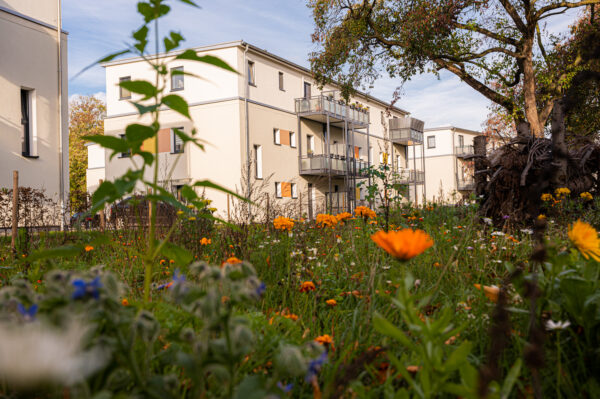Resource and Climate Protection in Business Operations
GRI
302-1
302-4
In contrast to the manufacture of industrial and consumer goods, letting homes is not a resource-intensive business. Therefore, only a very small proportion of our greenhouse gas emissions – less than 3% – are caused by our own operations (based on Scope 1 and Scope 2). Nevertheless, we continuously seek out opportunities to increase our level of resource efficiency and reduce our impact on the climate and the environment in our internal processes. Our vehicle fleet, our tools and appliances, our own office buildings and the behavior of our employees all offer opportunities to make a difference, e. g, by transitioning the fleet to low-emission vehicles, using power-saving electrical appliances for work in neighborhoods, buying green power for office buildings and avoiding business travel and transport.
The vehicle fleet accounts for about three-quarters of emissions from our business operations. Following the merger with Deutsche Wohnen, Vonovia had approx. 6,065 vehicles – primarily light commercial vehicles for use by our technicians and the residential environment service in Germany. This is therefore where we have the most leverage for reducing carbon emissions in our own processes. We continued the process of switching our fleet over to low-emission vehicles over the course of the year. Whenever possible, we provided innovative transport solutions based on small low-emission vehicles. The company limited the speed of its commercial vehicles to reduce emissions. We are also continuing to switch our fleet over to electric vehicles and are using more bikes and electric bikes. Electric vehicles are now available as company cars. We continued to gradually add electric vehicles to our fleet in Austria. We have made a correction to the calculation of our emissions, which has resulted in the journey length calculated being lower and thus the average consumption and emissions being higher than previously. We have also applied this change to the figures for 2021 (253 instead of 210 g CO2 /km). Our measures have led to a reduction in average consumption of around 3.8% (from 8.3 to 8.0 l/100 km). The average emissions fell by 4.8%. Despite an increase in the size of the fleet due to the merger with Deutsche Wohnen, the average energy consumed by the fleet has risen at a disproportionately lower level of +1.3% to 5.5% (319 vehicles).
We are not just aiming to use our resources as efficiently as possible when it comes to mobile energy consumption, but also in our offices and administration buildings. In Germany, we have a legal obligation to complete an energy audit once a year pursuant to DIN EN 16247-1. The last audit was in 2020. This includes random inspections and an examination of the energy aspects of our business operations in the buildings that we use ourselves. The areas that were identified for improvement can be applied to the entire Group due to the homogeneity of asset structures and consumption patterns at Vonovia. The recommendations of the energy consultant who performs the audit are forwarded as packages of measures to the Group’s organizational units who then implement these at their individual locations. These include energy- and resource-saving measures such as LED lighting, using motion sensors with lighting systems or installing air heat pumps as energy-efficient heating solutions. Our IT department has introduced an automatic screen shutdown following 15 seconds of inactivity and thus implemented a recommendation from the energy audit. We are also moving towards paperless offices. We have brought the next audit forward to 2023 in order to take Deutsche Wohnen’s administration buildings into account at an early stage.
We began transitioning the administration buildings that we use from our portfolio to green electricity from our own energy generation and sales division Vonovia Energie Service GmbH (VESG) in the 2022 reporting year. This initially affects around 60 sites concentrated in the South region. All of these sites are now supplied with carbon-free green electricity. All office locations of BUWOG in Austria have used certified green electricity (UZ46) since 2021. In addition to improving our carbon footprint, this also optimizes our internal processes. We therefore intend to roll this model out to other regions.
Both our corporate headquarters in Bochum and BUWOG’s central administration building in Vienna have sustainability certificates. The building in Bochum holds a DGNG Gold certificate while the building in Vienna has a ÖGNI Gold certificate. BUWOG has an ISO 50001-certified energy management system in place for all Austrian operations and the German development division.
In the field of our residential environment service, too, we were able to take another step in reducing the use of fossil fuels. The project initiated last year to make the switch from gardening equipment with combustion engines to more environmentally friendly battery-powered equipment was continued in the reporting year. Around 1,500 battery-powered tools are now in use. The new appliances are highly recyclable and have the potential to significantly lower carbon and noise emissions, benefiting our tenants and improving the health of our employees. We have decided to expand our product range in 2023 and test mobile charging options.


